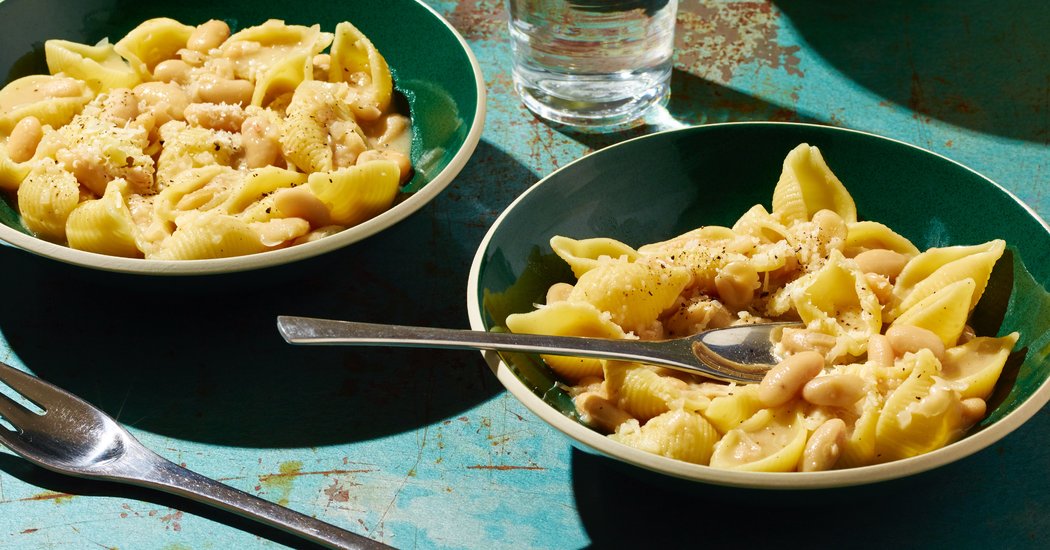
I’ve always thought of beurre blanc as a fragile, fussy, special-occasion sauce. The quiver of butter, wine and vinegar is a delight — if it’s emulsified correctly, then kept at the exact right temperature. Warm and coddled, it’s shiny, opaque and about as runny as fresh cream, which it is, sort of. Beurre blanc is butter turned back into cream, the arrow of time reversed in a kind of dark magic trick. But let the emulsion get too cold, and the sauce breaks. Overheat it, and it might get weepy and threaten to split.
I see it in a tiny saucepan, in a quiet, carpeted dining room overlooking a twinkling city, poured over a poached lobster tail or the season’s first fat white asparagus. Some chefs will even replace the wine in the sauce with Champagne, or at least say they do on the menu. Maybe because of beurre blanc’s prestige, its loose associations, its long established rep as a delicate, somewhat aspirational sauce, I can’t remember the last time I made it at home.
It was the British writer Jack Monroe who changed my mind. Monroe, who was raised with Irish and Cypriot parents, is best known for writing about cooking on a budget. She does this thoughtfully, often listing supermarket prices next to her ingredients, and practically, calling for ingredients that are relatively affordable and available. Monroe, who relied entirely on donations from food pantries for about six months as a single mother a few years ago, is a cook who’s learned how to get the most out of canned goods, which were easier for her to find and store than fresh foods. Her latest book, “Tin Can Cook,” published in May, is a paperback collection of simple recipes that center on tin cans. Though Monroe wrote it specifically for beginner cooks who count on food banks, and has placed copies of the book in about 400 food pantries around Britain, it’s also become a cult favorite with campers, college students and other people looking to cook deliciously on a tight budget.
So this is, maybe, not the book where you’d expect to run into a dreamy, flouncy, irresistible recipe for beurre blanc. And that’s sort of the point for Monroe, who wanted to make practical ingredients as tasty and luxurious as possible. A little wine and butter do a lot of work, though Monroe has been criticized for using wine in her recipes, as if only cooks of a certain pay grade deserve to taste it. “I have very little time for the notion that some foods are ‘not for poorer people.’ ” she writes, in her introduction to cannellini-bean beurre blanc.
I realized, reading Monroe, that while beurre blanc might sound posh, and indicate a certain class of foods in our collective imagination, the sauce doesn’t, in fact, belong to anyone. And it doesn’t require a poached lobster tail, or the season’s first white asparagus.
Monroe’s recipe starts with a can of beans. Rinsed of their light, industrial goop and boiled in some hot stock, the beans soften, turning creamy inside. Monroe, meanwhile, doesn’t fuss over the beurre blanc: All the ingredients go into a small saucepan — a few tablespoons of wine, vinegar and butter, with a chopped shallot — and simmer together over low heat until they’re a little mellow and reduced. A little pasta, not a lot, is added to the beans and stock, and boiled until it’s just about cooked through. Tip in the beurre blanc, and it begins to emulsify with the stock. And after everything has simmered together for a few minutes, the stock reduces to a starchy, silky sauce. It’s time to serve it in bowls, covered with cheese. Monroe’s dish is built from basics, but it’s undeniably deluxe. “I want to live in a world where everyone should be able to put a beurre blanc on the table without hesitation,” she writes.
It’s the kind of recipe you make once and immediately add to your repertoire: straightforward, inexpensive and comforting. And you can build on it if you like. If you happen to have a bunch of chard or mustard greens in the fridge, chop it up and wilt it right into the pasta when you add the beurre blanc. Or scatter the top with a mix of chopped herbs. You can get fancy, but know that if you’ve got nothing extra, just the bare essentials for the recipe, it will still feel like a special occasion.




